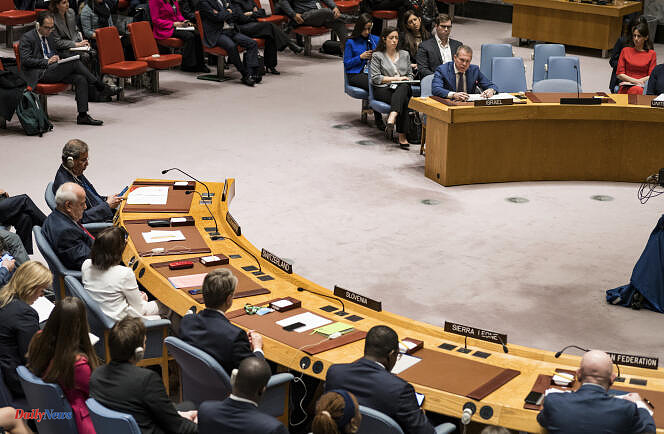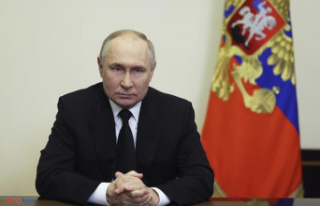The war between Israel and Hamas has left 32,333 dead in the Gaza Strip, mostly civilians, according to a report released Monday March 25 by the Palestinian Islamist movement's health ministry.
During the day, a first resolution calling for an “immediate ceasefire” in the Palestinian enclave was passed by the UN Security Council, thanks to the abstention of the United States, which caused the anger of the Israeli authorities. On the ground, operations continue near two large hospitals, accused by Israel of housing Hamas bases.
In a report released Monday, Fransesca Albanese, the United Nations special rapporteur for the Palestinian territories, says there are “reasonable grounds” to believe that Israel has committed several acts of genocide in the Gaza Strip. “The overwhelming nature and scale of the Israeli assault on Gaza and the destructive living conditions it has caused reveal an intent to physically destroy the Palestinians as a group,” Albanese said in her report. present Tuesday to the Human Rights Council in Geneva.
In her findings, Fransesca Albanese lists three acts of genocide: “killing of group members; serious harm to the physical or mental integrity of members of the group; and intentional subjection of the group to conditions of life calculated to bring about its total or partial physical destruction.”
At the end of January, seized by South Africa, the International Court of Justice found that there was a real and imminent risk to the rights of Palestinians, including their protection against genocide. To this end, the magistrates pronounced six precautionary measures, the most important being the request to Israel to “take all measures in its power to prevent the commission of genocidal acts”.
After more than five months of war, the United Nations Security Council on Monday adopted its first resolution demanding an "immediate ceasefire" in the Gaza Strip, a call blocked several times by the United States, which are this time abstained.
The resolution was adopted with fourteen votes in favor and one abstention, and calls for an “immediate ceasefire during the month of Ramadan” – which began two weeks ago – leading to a “durable ceasefire”. . The resolution calls for the “immediate and unconditional release of all hostages,” reports Agence France-Presse (AFP), which was able to consult the text.
The abstention of the United States aroused the anger of Israel, of which it is the historic ally: the Israeli Prime Minister, Benjamin Netanyahu, canceled the sending of a delegation which was expected in Washington and ensures that this abstention harms “efforts to free the hostages.” On the American side, we deplore a reaction considered disproportionate on the part of Israel. The United States assured that its decision was not a “change of course”.
So far, Washington had vetoed several resolutions calling for a ceasefire; but with more than 32,000 dead in the Gaza Strip, according to Hamas, and the risk of famine in the besieged Palestinian territory, the United States had said it wanted to redouble its efforts for a truce. Last Friday, they proposed a resolution to this effect. The text was rejected by the UN Security Council after Russian and Chinese vetoes.
The resolution adopted Monday is the result of the work of non-permanent members of the Council, who negotiated every weekend with the United States in order to stop a new failure. Several entities, including Turkey and the Palestinian Authority, welcomed this vote. French diplomacy announced that it was preparing a resolution calling for a “permanent ceasefire”.
Dozens of Israeli strikes hit the Gaza Strip on Monday, where at least two major hospitals are targeted by military operations. According to the Hamas health ministry, the bombings left at least 107 dead in twenty-four hours, including at least twenty-six in Rafah.
A week after the start of the intervention, launched on March 18 against Al-Shifa hospital – the largest in the besieged Palestinian territory – fighting continues. The hospital and its surroundings were targeted by artillery fire on Monday, according to the Hamas authorities, as were the surroundings of the Al-Amal hospital in Khan Younes (South), besieged since the day before by the army.
Witnesses also reported an incursion on Sunday near the Nasser hospital, near Al-Amal. The Palestinian Red Crescent described to AFP a nighttime evacuation of this hospital “complicated for its staff and patients”. According to the organization, two employees were targeted by Israeli fire while trying to free their ambulances from pieces of debris. “More than twenty terrorists were eliminated in the Al-Amal sector over the past day, in close combat and airstrikes,” and weapons including rocket launchers were discovered, the army says. who adds that he facilitated “the evacuation of hundreds of Gazans from the area and questioned dozens of suspects.”
Since the start of the war against Hamas launched in October, troops have carried out several operations in and around hospitals. They explain that they are looking for Palestinian fighters there, with Hamas denying that it uses hospitals as rear bases.
During a visit to Al-Wihdat, a Palestinian refugee camp in eastern Jordanian capital Amman, UN Secretary-General Antonio Guterres defended the UN refugee agency Palestinians (UNRWA). Mr Guterres said it would be “cruel and incomprehensible” to cut off UNRWA services to Palestinian refugees across the region. This statement follows the announcement by the UN agency that Israel has formally prohibited any delivery of food aid to the north of the Gaza Strip.
In January, Israel accused UNRWA employees in the Gaza Strip of involvement in the attack carried out by Hamas on Israeli soil on October 7. Around fifteen countries, notably the United States, suspended their funding at the end of January after the Israeli accusations, which put the agency in financial difficulty, although several of them have since resumed their payments. “Here in Jordan, but also in Syria, Lebanon and, of course, the occupied West Bank and Gaza, UNRWA is a source of hope and dignity,” said the UN Secretary-General.
“In an increasingly dark world, UNRWA is the only beacon of hope for millions of people. I see that hope here. Today more than ever, we must not lose this hope,” said Mr. Guterres. He also wanted to “pay tribute to the 171 UNRWA women and men killed in Gaza – the highest number of UN personnel killed in our history.”
Some 5.9 million Palestinian refugees are registered with the UN agency in the region.












